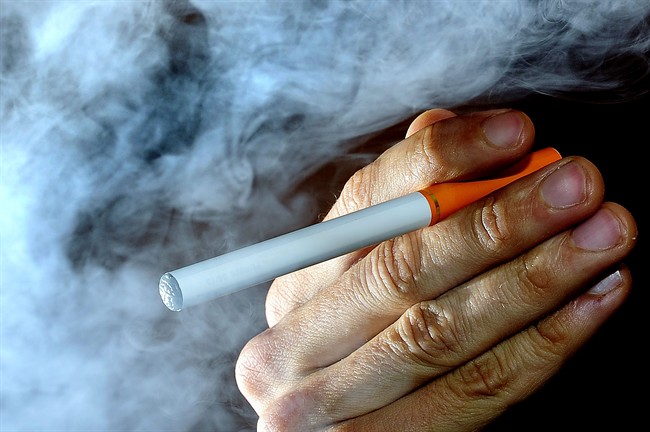They’re touted as safer alternatives to cigarettes, but a new U.S. report on e-cigarettes warns they may be causing a spike in poisonings. Is the same trend happening in Canada?

U.S. poison control centres went from receiving a single e-cigarette call per month to nearly 200 calls by 2014, according to a report released by the U.S. Centers for Disease Control and Prevention earlier this month.
It calls e-cigarettes a “major public health concern.” Dr. Martin Laliberté, director of the Canadian Association of Poison Control Centres, agrees.
“In Canada, there seems to be anecdotal reports that suggest a similar trend … the general impression that we have coming from all five of our poison control centres across the country is that it’s becoming more and more frequent,” Laliberté said.
“There are some pretty significant amounts of calls coming in.”
READ MORE: E-cigarettes, cancer rates concern tobacco opponents
The culprit, according to the CDC, is the liquid nicotine in the e-cigarettes. Sometimes, the liquid is contained in the device that’s disposable or rechargeable. In other instances, the cartridge is opened and refilled.
If it isn’t done properly, or gets into the wrong hands, the liquid could cause skin or eye irritation, nausea or vomiting.
Unlike the U.S., Health Canada hasn’t approved e-cigarettes with nicotine, so the e-cigarette device and any liquids that containing nicotine can’t be sold in Canada until products obtain approval. The federal agency wouldn’t say how many applications have been filed.
“To date there is not sufficient evidence that the potential benefits of e-cigarettes in helping Canadians to quit smoking outweigh the potential risks,” Health Canada spokesperson Gary Holub told Global News in a written statement.
“A company would have to provide evidence of safety, quality and effectiveness in order to have its product authorized. Without this scientific evidence, Health Canada continues to advise Canadians against the use of these products,” he said.
The Canadian Cancer Society also doesn’t promote e-cigarettes to consumers, according to senior policy analyst Rob Cunningham.
“We would only recommend nicotine replacement products approved by Health Canada,” he said. So far, that only includes five products: gum, the patch, lozenges, an inhaler and mouth spray.
But that’s not stopping Canadians from getting their hands on e-cigarettes with nicotine.
“Some consumers are obtaining e-cigarettes with nicotine despite the fact that they’re not approved yet. Some stores are selling them or they’re purchased online,” Cunningham said.
READ MORE: Vancouver School Board considers banning e-cigarettes
Because Health Canada doesn’t track adverse effects stemming from an unapproved product and there isn’t a national database documenting calls, recording the number of poisonings linked to e-cigarettes is spotty.
In B.C., for example, in the past two years, only 12 exposures to nicotine fluids for e-cigarettes were recorded.
“This is just a cursory scan and may not be entirely accurate,” the B.C. Centre for Disease Control told Global News.
Alberta doesn’t have any figures singling out e-cigarettes at all: “We do not currently have any statistics regarding e-cigarettes as they are still relatively new,” a spokesperson said.
Ontario logged 10 calls, including two kids, two teens and six adults in the last year. The province’s poison control centre says it receives far more calls linked to children being exposed to real cigarettes. Parents leave ashtrays out, children pick up butts on the street or in the playground or they even take whole cigarettes out of purses.
In 2013, for example, there were 111 calls in Ontario about cigarette poisonings, compared to only 10 e-cigarettes.
carmen.chai@globalnews.ca
Follow @Carmen_Chai




Comments